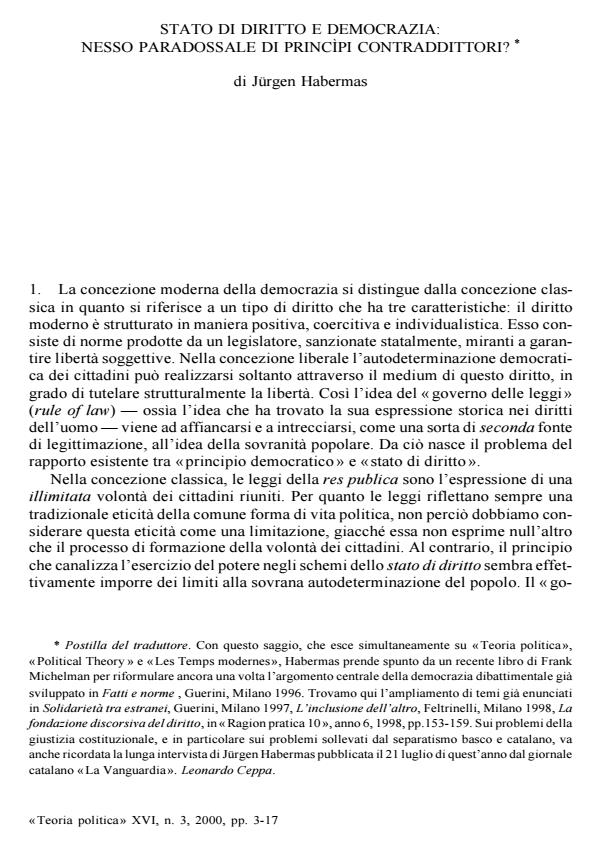Stato di diritto e democrazia: nesso paradossale di principi contraddittori?
Titolo Rivista TEORIA POLITICA
Autori/Curatori Jurgen Habermas
Anno di pubblicazione 1 Fascicolo 2000/3
Lingua Italiano Numero pagine 15 P. Dimensione file 40 KB
DOI
Il DOI è il codice a barre della proprietà intellettuale: per saperne di più
clicca qui
Qui sotto puoi vedere in anteprima la prima pagina di questo articolo.
Se questo articolo ti interessa, lo puoi acquistare (e scaricare in formato pdf) seguendo le facili indicazioni per acquistare il download credit. Acquista Download Credits per scaricare questo Articolo in formato PDF

FrancoAngeli è membro della Publishers International Linking Association, Inc (PILA), associazione indipendente e non profit per facilitare (attraverso i servizi tecnologici implementati da CrossRef.org) l’accesso degli studiosi ai contenuti digitali nelle pubblicazioni professionali e scientifiche.
The essay is a contribution to the debate on the complex argument for the interdependence of human rights and popular sovereignty. The first suggestion is to conceive human rights as what is necessary for the legal institutionalization of the democratic process of self-legislation. This is, however, prima facie plausible only for those civil rights (the rights of communication and participation) that empower citizens to exercise their political autonomy. The suggestion is less plausible for the classical human rights that guarantee citizens’ private autonomy. So it is further suggested to analyze the very grammar of the legal language which citizens must speak when they wish to act as citizens. In other words, the legal code as such must be available as soon as we would wish to legally institutionalize a democratic process. We know from the analysis of the legal form, however, that we cannot establish any kind of legal order without creating placeholders for legal persons who are the bearers of individual rights - whichever rights these may be. But providing subjective rights means per se to provide a guarantee for private autonomy. This then is the core of the argument: without basic rights that secure the private autonomy of citizens, there also would not be any medium for the legal institutionalization of the condition under which these citizens could make use of their public autonomy.Thus private and public autonomy mutually presupposes each other in such a way that neither human rights not popular sovereignty can claim primacy over its counterpart.
Jurgen Habermas, Stato di diritto e democrazia: nesso paradossale di principi contraddittori? in "TEORIA POLITICA" 3/2000, pp , DOI: